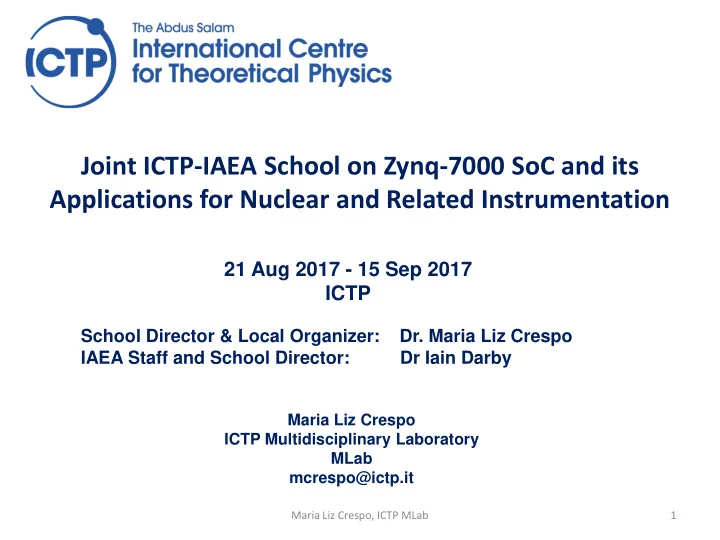

Joint ICTP-IAEA School on Zynq-7000 SoC and its Applications for Nuclear and Related Instrumentation 21 Aug 2017 - 15 Sep 2017 ICTP School Director & Local Organizer: Dr. Maria Liz Crespo IAEA Staff and School Director: Dr Iain Darby Maria Liz Crespo ICTP Multidisciplinary Laboratory MLab mcrespo@ictp.it Maria Liz Crespo, ICTP MLab 1
Hands-on Scool: Typical Daily Program Timetable 9:00 - 10:30 lecture 10:30 - 11:00 coffee-break 11:00 - 12:30 hands-on 12:30 - 14:00 lunch 14:00 - 15:30 lecture 15:30 - 16:00 coffee-break 16:00 - 18:00 hands-on Maria Liz Crespo, ICTP MLab 2
First week: SoC Technology: Hardware and Software System Architecture, Design Methodology, Embedded C, AXI Interface, Hw & Sw Interrupts, … - Vivado IDE 2016.4 - Zynq-7 family SoC - Hardware: ZedBoad development kit - Temperature Sensors Main Lecturer: Cristian Sisterna, Argentina Main Instructor: Kasun S. Mannatunga, Sri Lanka Maria Liz Crespo, ICTP MLab 3
Second week (first part): Embedded Linux High Level Synthesis with Vivado - Virtual Machine (VirtualBox) - Petalinux - Hardware: Image Sensors (ov7670 camera modules) Main Lecturers: - Fernando Rincón Calle, Spain - Julio Dondo Gazzano, Spain Maria Liz Crespo, ICTP MLab 4
Second week (second part): Embedded Real Time Operating System Multitasking RTOS Ethernet Communication (lwIP) - FreeRTOS - LabVIEW - Hardware: PMOD AD1, Pulse Oximeter Main Lecturer: Heinz Rongen, Germany Maria Liz Crespo, ICTP MLab 5
Third week: Nuclear Instrumentation and Nuclear Applications High Speed Data Acquisition Nuclear Pulse Generator and Digital Pulse Processing (shaping) Multi-Channel Analyzer - MatLab & Simulink - Hardware: ADC and DAC boards - IAEA detector system Main Lecturers: - Heinz Rongen, Germany - Mladen Bogobac, IAEA Maria Liz Crespo, ICTP MLab 6
Fourth week: Demo: PyQt for Graphical User Interface Development Lecturer: José Antonio De La Torre, Spain Parallel Sessions for Projects Development Project 1: Dynamic Partial Reconfiguration Main Lecturer: Julio Dondo Gazzano, Spain Project 2: Image Acquisition and Processing with HLS Main Lecturer: Fernando Rincón Calle, Spain Maria Liz Crespo, ICTP MLab 7
Fourth week: Parallel Sessions for Projects Development Project 3: High Resolution X-ray Spectroscopy Main Lecturer: Andres Cicuttin, ICTP Project 4: Scientific HPC using FPGA Main Lecturer: Jesús Barba Romero, Spain Maria Liz Crespo, ICTP MLab 8
Project: Dynamic Partial Reconfiguration Through this project-driven seminaries students will be able to develop a fully working dynamically reconfigurable system using Vivado Design tools and dynDet (dynamic partial reconfiguration design tool) developed by ARCO research group, University of Castilla-La Mancha. The project will be divided into three main parts: a) Introduction to a dynamically reconfigurable systems: theory and practical considerations. b) Design of a simple example of partially reconfigurable system, with one reconfigurable area. c) Design of a more complex example of a partial reconfigurable system with two reconfigurable areas and several reconfigurable modules. Maria Liz Crespo, ICTP MLab 9
Project: Scientific HPC using HLS HPC is, in essence, the art of doing things not only fast but in parallel, so you can boost the throughput levels of your system. This project introduces general ideas behind and basic principles of HPC tailored for an FPGA-based computer. The focus will be put on the main techniques to parallelize algorithms and how the result can be mapped to a network of hardware concurrent tasks; ready to be deployed in a FPGA chip. Other high-throughput strategies such as stream processing architectures will be learnt. Xilinx’s FPGA floating point support will be also studied, so the student gets an accurate picture of the actual capabilities of the Zynq technology concerning this important pillar in scientific HPC. The use case selected for this project is the multiplication of two floating-point matrixes. As simple as it might seem, the use of matrix multiplication is key in linear algebra and plays an important role in quantum mechanics, and all throughout physics. The simplicity of the algorithm allows the student to focus on the techniques and procedures to be applied so as to evolve the baseline project into an embedded HPC implementation. Maria Liz Crespo, ICTP MLab 10
Project: High Resolution X-Ray Spectroscopy Particle Detection Systems based on SoC for high performance data acquisition, online processing, and transmission - Silicon Drift Detector (SDD) based system for high-resolution spectroscopy of low- energy X-ray photons -Digital Pulse Processing (DPP) for on-line single X-ray photon detection and energy measurement at high flux rates - Digital filtering optimization - FMC ADC board (ADC 8-bits 500 MS/s) for - high speed data acquisition - high time resolution measurements - Characterization at different energies of a monolithic 8-channel SDD system for fluorescence spectroscopy Maria Liz Crespo, ICTP MLab 11
Lab projects Login: .\ictpadm Password: ****** Shared Folder ( at Public P: ) : smr3143 Maria Liz Crespo, ICTP MLab 12
Recommend
More recommend